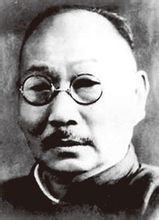Xia Zunmian
Xia Mianzun (夏丏尊 Jun. 15, 1886-? ,1946) was a prominent Chinese linguist and literati. He was also an idealistic educator, dedicated to improving the quality of the country’s backward education system. He held a short-term tenure as dorm superintendent in Zhejiang No.1 Normal School.
Born in Shaoxing, Zhejiang, Xia had picked up the Chinese classics when he was very young. In 1901, he passed the imperial exam for Xiu Cai, the primary level of Chinese scholars ready to be court officials.
In 1905, he embarked on his overseas academic pursuit in Japan through loans. Two years later however, he had no choice but to abandon his studies due to a lack of financial resources as he failed in applying for more loans from the government.
In 1908, He became the assistant teacher in the Zhejiang No.1 Normal School, deemed as the center of southern China in terms of the influence of the so-called New Thought after the May 4th Movement. He recommended himself for the position of dorm superintendent, a post that most teachers would baulk at.
His strict rule advocating the integrity and compassion of the students met with some protests. But for many of the students, they accepted his tending as that of a father’s love for his children.
In 1919, he and his three colleagues, Chen Wangdao, Liu Dabai and Li Cijiu, promoted the educational reform of Chinese language. Yet their advocating to steer away from Beijing’s New Cultural Movement-led by modern Chinese literati, Li Dazhao, Hu Shi and Chen Duxiu-was strongly opposed by the conservatives, who later drove them to resign one by one.
He then left Hangzhou, Zhejiang Province, to Changsha, Hunan Province, to take up the position of Chinese teacher in Hunan No.1 Normal School. In 1921, by invitation from the former headmaster of Zhejiang No.1 Normal School, Xia went back to Zhejiang to teach in Chunhui Middle and High School. At that same time, he joined the Literature Research Society when it was established. It was then that he translated the Italian author Edmondo De Amicis’ popular work “Cuore” (“Education of Love”).
In 1925, Xia went to Shanghai to join the faculty of the Li Da Middle and High School, and in the meantime translated “Quilt,” a novel by Japanese naturalistic writer Katai Tayama. In 1927, he became the director of the Chinese Literature School at Shanghai’s Jinan University. Based on his experiences as a teacher, he established the magazine named Middle-and-High-School Students. Two years later, the sequel of “Spirits of the Words” (《文心》), which was regarded epochal in Chinese education, was published in the magazine.
In 1934, Xia published his own prose collection—“Stories on the Bungalow.”
He set up the Jiuwang Daily (the term jiuwang can be interpreted as “rescue the nation from extinction”) in 1939, during the Anti Japanese Aggression War (1939-1945) in Shanghai. In 1943, he was detained by Japanese military police. However, thanks to his Japanese friend Kanzou Utyiyama, he got out, though his health had greatly deteriorated while in prison. Despite the grave circumstances he found himself in, Xia managed to translate “Tibetan Buddhist Scripture in Southern China.”
He died in 1946, one year after the absolute surrender of Japan in World War II (1939-1945).
